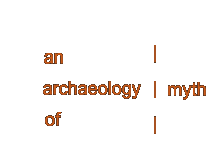
Stop for a moment and examine more closely the world in which you have enmeshed yourself.
 |
|
|
It is reasonable, functional, even necessary to describe ourselves and our surroundings in the language of the prosaic. By prosaic, I mean that we read the world the way we read language found in a dictionary. If we happen to be in a law school, or a law firm, the people with whom we work, and even the work itself, can be imagined as fully scripted, as role dictated. The work is described in functional terms. We are so often inscribed by our roles that Reality becomes the trump card. Reality trumps Myth, and then begins to look like its own form of Myth. Students of law know this transmutation first hand. Law school represents the stuff of Reality: Roles, Rules, Adversarial Zeal, Reading. Becoming a lawyer requires one to knuckle-down, get real, and drink heartily of bottled necessity. In learning to become a lawyer, the analytics, instrumentalism, and objectification are quite real. Reality is sought and worshiped, before the costs of our reality worship are assessed. Who dares question Law as Reality? Look again. Look at what is happening around you. Reflect on the classroom where you learned to be a lawyer, on your own relation to law and your clients, the politics of law you discuss with your colleagues, and the newspaper despairing news of your profession. One might see in the many private and public accounts of law and lawyering a titanic struggle to control, expand, and deconstruct the myths we find in law and in our lives as lawyers. When titans struggle, we must watch for cracks in the seamless presentation of necessity, in assumption about reality. We must watch for the underlying tensions that expose our secular conceptions of law, a world of law that knows no myth. Look again at these days, outside and beyond the buildings in which you studied and practiced law. When the days tumble into years and the sense of immediacy gives way to time, you may find that the daily press of necessity has collapsed into a story, a familiar one, or a strange one. Our lives, given time and memory, seem bigger than the boxes we construct for them, more expansive than the descriptions we dole out to others when asked "what are you doing here?" In the pattern you have created with a life of work and play, movement and statis, engagement and withdrawal, confrontation and acquiescence, hope and despair, is there no sense that you may have been guided or seized by one or another myth? That in following the path you have that you have resisted a myth or two along the way? If we're curious and puzzled by what we find around us, then we may be closer to myth than we would have suspected. Traditionalists and critics are bound, in a jurisprudence of memory and loathing, to mythic struggle; they stand watch for an enemy feared but seldom sighted. We fear what we do not know and seek security in Law and Order. For the security minded conservative, a system of rules will be paramount. The Critic watches, ever vigilant, as law perpetrates a cruel and unjust hierarchy of have's and have not's, legitimating itself falsely as a servant of justice. Law is one of those complex tools we invent and pass along as a cultural inheritance. Law is a cultural movie, an up-dated version of Greek tragedy. Can we say with confidence, "I just have no interest
in myth. I'm a firm believer that we've gotten past all that." |